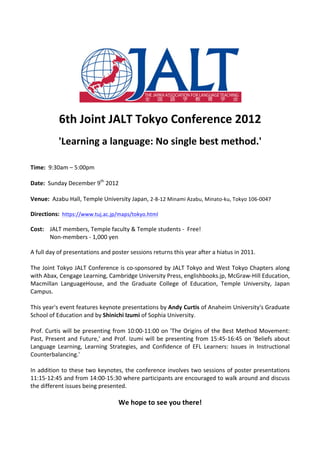
6th Joint JALT Tokyo Conference 2012 flyer
- 1. 6th Joint JALT Tokyo Conference 2012 'Learning a language: No single best method.' Time: 9:30am – 5:00pm Date: Sunday December 9th 2012 Venue: Azabu Hall, Temple University Japan, 2-‐8-‐12 Minami Azabu, Minato-‐ku, Tokyo 106-‐0047 Directions: https://www.tuj.ac.jp/maps/tokyo.html Cost: JALT members, Temple faculty & Temple students -‐ Free! Non-‐members -‐ 1,000 yen A full day of presentations and poster sessions returns this year after a hiatus in 2011. The Joint Tokyo JALT Conference is co-‐sponsored by JALT Tokyo and West Tokyo Chapters along with Abax, Cengage Learning, Cambridge University Press, englishbooks.jp, McGraw-‐Hill Education, Macmillan LanguageHouse, and the Graduate College of Education, Temple University, Japan Campus. This year's event features keynote presentations by Andy Curtis of Anaheim University's Graduate School of Education and by Shinichi Izumi of Sophia University. Prof. Curtis will be presenting from 10:00-‐11:00 on 'The Origins of the Best Method Movement: Past, Present and Future,' and Prof. Izumi will be presenting from 15:45-‐16:45 on 'Beliefs about Language Learning, Learning Strategies, and Confidence of EFL Learners: Issues in Instructional Counterbalancing.' In addition to these two keynotes, the conference involves two sessions of poster presentations 11:15-‐12:45 and from 14:00-‐15:30 where participants are encouraged to walk around and discuss the different issues being presented. We hope to see you there!
- 2. Plenary #1: 10:00-‐11:00am The Origins of the “Best Method Movement”: Past, Present and Future. These days, few would argue that there is just one best method for learning a language. However, 75 years ago, in October 1937, The Modern Language Journal published an article entitled “Lecture on the best methods of teaching the living languages”, given by Professor George Ticknor, then at Harvard University. Ticknor’s talk had been given more than 100 years previously, on 24 August 1832 – nearly two centuries ago. This may, then, be one of the few times that the origin of a long-‐prevailing idea in language education can be precisely pinpointed. According to Ticknor: “The easiest and best method, therefore, for persons of all ages and all classes to learn a living language is undoubtedly to learn it as a spoken one” (1937, p.19). In Ticknor’s talk, we can also see the origin of what we now refer to as the Native-‐Speaker Myth, in which native-‐speakers of the target language were (or still are) assumed to be the best teachers of the language: “Persons, then, who have the opportunity, should learn the living language they wish to possess, as it is learnt by those to whom it is native” (1937, p.19). In this plenary, we will look at the “best method movement”: where we are now, where we have been and where we are going. Bio-‐information Professor Andy Curtis is an independent consultant for international education, based in Ontario, Canada. He is currently teaching in the Graduate School of Education at Anaheim University, California, USA, and in the Department of Languages and Cultures at Sabana University, in Bogota, Colombia. He received his MA in Applied Linguistics and Language Education, and his PhD in International Education, from the University of York in England. Until recently, he was the Director of the English Language Teaching Unit at The Chinese University of Hong Kong, and he has also taught at the School for International Training in Vermont, USA. Plenary #2: 15:45-‐16:45pm Beliefs about Language Learning, Learning Strategies, and Confidence of EFL Learners: Issues in Instructional Counterbalancing. What ideas do second language (L2) learners have about the nature of language learning? How did they come to have those ideas? These questions have attracted interest of language teachers and Second Language Acquisition researchers because learners’ ideas or philosophies about L2 learning potentially exert strong influence on both the process and product of L2 learning. It is generally believed that learners’ beliefs constitute a variable that accounts for individual differences in L2 learning and thus are viewed as an important construct to be investigated in relation to their subsequent impact on learners’ behaviors. In this talk, I am going to talk about my recent study that investigated how learners’ previous learning backgrounds influence their beliefs about L2-‐learning approaches, their uses of learning strategies, and their self-‐efficacy and confidence in their L2 abilities. I will discuss the implications of the results for language learning and teaching. Bio-‐information Professor Shinichi Izumi is a professor at Sophia University, Tokyo, Japan, where he teaches in the BA program in English Language Studies and the MA and the PhD programs in Applied Linguistics and TESOL. He received his MA in Applied Linguistics from Southern Illinois University at Carbondale and his PhD in Applied Linguistics from Georgetown University. He has been involved in EFL teacher education throughout Japan and has published widely both nationally and internationally in areas related to instructed second/foreign language acquisition, in particular on topics related to CBI (Content-‐based Instruction), TBI (Task-‐based Instruction), Focus on form, and CLIL (Content-‐and-‐Language-‐Integrated-‐Learning).
